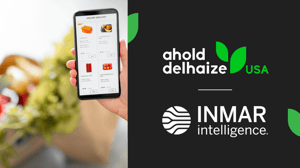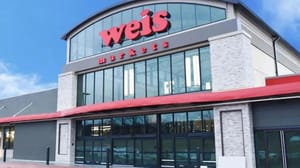Kroger Named Winsight Grocery Business of the Year
Retailer recognized for progress against audacious sustainability goals in difficult circumstances. For progress against audacious sustainability goals in difficult circumstances, and for creating a movement that has inspired and engaged partners throughout the food chain, Kroger is WGB’s Grocery Business of the Year.

The global coronavirus pandemic tested food retailers in lots of ways, often with divergent and paradoxical impacts. They rose to the occasion as essential businesses feeding a locked-down nation, but safety concerns put workers and customers in danger. Political and social upheaval thrust supermarket executives into business leadership positions where their responses to one controversy after another—from masks and vaccines to worker pay—were not always received warmly but were important as investors and customers increasingly looked to support companies that stand for what they believe in.
Supermarkets sold a lot of food but the supply chain broke down. Consumers demanded new ways to shop, but stores lacked the infrastructure to provide it in the volumes or at the service levels they might have liked. High sell-through and a related reduction in shrink was terrific for the top and bottom line, but that too came with a parallel drawback: The more food you sell, the less there is to give away.
For Kroger, which dealt with every one of those crises in 2020, the latter concern represented a threat to an internal plan to donate rescued food—a cornerstone of its Zero Hunger | Zero Waste social impact plan. In fact, surplus food donation from the Cincinnati-based retailer dipped by about 10% from 2019 to 2020, even as the economic impacts of the coronavirus contributed to a worsening of a nationwide food insecurity plague the program is intended to address.
“More people were stocking up, eating food at home and preparing meals. So it was good for business,” says Keith Dailey, group VP of corporate affairs for Kroger and a board member of the retailer’s association Zero Hunger | Zero Waste Foundation, in an interview.
“But [2020] also changed the trajectory of our food donation program,” he continues. “Being responsive to the great need we saw in our communities, we were intentional in increasing the amount of strategic philanthropy that we were driving toward the cause last year.”
By the time the year was over and the pandemic was receding, Kroger was a changed company but still on track with its ambitions. It adjusted to a reduction in surplus food by increasing its charitable cash donations toward hunger relief organizations to $213 million, or slightly more than two-thirds of the more than $300 million the foundation contributed last year.
The combination of rescued food—about 90 million pounds—and cash increased its total donations to an equivalent of 640 million meals in fiscal 2020, or a 29% increase from the 493 million meals it donated in fiscal 2019. Since kicking off Zero Hunger | Zero Waste in 2017, Kroger has donated the equivalent of 1 billion meals.
“That demonstrates the power of setting an aspirational but clear goal, because it starts to align various aspects of the business toward achieving it,” Dailey explains. “Our charitable giving is a good example of where that alignment has made a big difference. It’s a good demonstration of how we tried to be responsive to the crisis.”
Kroger at the same time continued progress in its efforts to reduce waste, diverting 81% of its waste from landfills in calendar year 2020, up by 1% from 2019. The company also reduced total trash sent to landfills by 4% vs. the prior year and expanded an in-store waste recycling program to 2,285 of its stores, introducing the program to its Dallas, Houston and Central (Illinois and Indiana) operating divisions.
Though food retailers collectively are responding to sustainability concerns like never before, for its foresight, its progress against audacious goals in difficult circumstances, and for establishing an authentic sense of urgency around them that has engaged partners throughout the food chain and permeated company culture in a way that portends better health for its business, its customers and its planet, Kroger has been selected as Grocery Business of the Year by the editors of WGB.
‘I Don’t Think That’s What We’re Trying to Do Here.’
Zero Hunger | Zero Waste is a social impact plan built around addressing a vexing paradox of troubling conditions impacting the world of food and food merchants: On the one hand, entirely too much food—40% by most estimates—goes to landfills in the U.S.; on the other hand, 1 in every 9 Americans are food insecure.
Specifically, the program aims to address hunger by donating 3 billion meals in the communities in which it does business by 2025 and by achieving “zero waste”—specifically, diverting 90% of waste from landfills at all its owned facilities, by the same date.
After spending about a year developing the program internally, Kroger officially kicked off the effort in September 2017 as a brand platform that brought together aspects of ongoing parallel programs—a waste-reduction plan that had been a part of sustainability efforts for about a decade and hunger relief ambitions that, according to Dailey, date as far back as the company’s 19th century founder Barney Kroger, who was known around Cincinnati for donating day-old bread that didn’t sell in his store. This gave Kroger a sturdy platform of authenticity upon which to build.
"There is a deeply rooted history and heritage of feeding hungry people that is inherently authentic to The Kroger Co., and the grocery industry in general, and we’re proud of that."
“There is a deeply rooted history and heritage of feeding hungry people that is inherently authentic to The Kroger Co., and the grocery industry in general, and we’re proud of that,” Dailey says. “Fast-forwarding, when you think about developing a social and environmental impact plan—a building platform or brand that the company can get behind—that is only possible because of previous leaders in the company.”
Specifically, Dailey cites Lynn Marmer, whom he says was instrumental in developing the food rescue programs in partnership with Feeding America that Zero Hunger | Zero Waste continues to refine; Jessica Adelman, his predecessor as corporate affairs VP; and Denise Osterhues, the company’s senior director of sustainability and social impact.
These executives also found a key advocate in the CEO’s office. In fact, Dailey says, it was Rodney McMullen’s encouragement to think in more impactful terms as they developed the program that provided the energy to present it as boldly as they would.
At the time, Dailey recalls, they were building the program around its metrics—specifically the sum total of donated meals—but that presentation got a jolt from McMullen’s remarks in a progress meeting.
“We said, ‘We’re going to reach or exceed 3 billion meals by 2025, and sort of build the program around that.’ And he said, ‘You know, that’s terrific. And I don’t want to diminish what that will mean to our communities and our company in terms of the ability to deliver on something like that. But I don’t think that’s what we’re trying to do here.’ He wanted us to think bigger: It wasn’t about a number of meals. It was, ‘I thought we were trying to end hunger.’
“There are moments in your professional life where you feel like you have an out-of-body experience,” Dailey continues. “You’re like, ‘I don’t know how we’re going to accomplish that.’ I remember my colleague Denise [Osterhues] and I walking out of that meeting and saying, ‘All right. It’s time to go back to the drawing board.’ And what we realized was, if we’re really trying to address the nexus between hunger and waste, what are we really trying to get done here? And ultimately, it was we want zero waste across our business, and we want to end hunger.”
Behind McMullen’s encouragement to emphasize not just the amount of donated meals or reduced waste—but the impact of doing so—a young project manager at Kroger, Kari Armbruster, was whiteboarding in her office when she came up with the “Zero Hunger | Zero Waste” name that became the project’s identity.
A small amount of personal inspiration played a role in the moment too: “I don’t know if you’ve ever had a colleague about to go off on maternity leave, but you try to clear a lot off the desk,” Armbruster, at the time a soon-to-be-mom, recalled.
The phrase reflects the “tension” inherent in the program’s twin ambitions and draws intellectual attention to its central paradox. “That’s a very important part of it,” Dailey says.
People Want To Be a Part of This
There are other tensions at work in the program’s success as well. Much of that stems from the aspirational nature of tackling big issues the retailer is under no illusions it can solve on its own. McMullen calls the notion of hunger elimination a “moonshot.” Getting that rocket into the air has meant engaging and inspiring a variety of advocates among customers, employees, trading partners, nonprofits, emerging technologies, investors and government.
“At the time we were building it, we used words like ‘movement.’ Like, how do we develop a movement around this which creates sort of an aspiration and excitement?” Dailey says. “And we’ve certainly seen over the last few years, people want to be a part of this. I think part of that comes out of a powerful element of Kroger’s corporate character, which is humility. We knew then we didn’t have all the answers, [and] we still don't have all the answers today. We’ll never have all the answers. And it’s important for us to acknowledge that, so that we can go and find partners who can help us develop the answers because the problem is bigger than any one company or any one individual.”
Kroger since 2017 has forged dozens of partnerships with companies that can help in big and small ways. Its efforts include everything from software (Shelf Engine) that officials say reduces waste by ordering items for fresh departments using artificial intelligence, to buying avocados treated with a plant-based “skin” (Apeel) that lengthens shelf life. Still, more discrete issues are being tackled through financial support of startup entities. A cohort of 10 startup upcycled food brands this year, for example, are receiving $2.5 million in support from Kroger’s Zero Hunger | Zero Waste Foundation and a partnering venture bank, Village Capital.
Earlier this year, Kroger said it would transition all its private-label products to 100% recyclable, compostable or reusable packaging by 2030 as it begins setting new long-range targets for sustainability. That initiative—also stemming from a partnership with the recycling company Terracycle, with whom Kroger later this year is rolling out a first-of-kind branded packaging reuse program called Loop—was addressed as part of Kroger’s Environmental, Social and Governance (ESG) Report issued to investors. That illustrates how its social ambitions are dovetailing with business, and increasingly, centering Kroger’s ESG efforts. Further aligning Zero Hunger | Zero Waste to Kroger’s ESG—for example, emphasizing the relationship between waste and climate change—will be a key point of emphasis in the years ahead, Dailey notes.
"We believe that ESG is becoming not only an investment philosophy but something that’s more accessible to mainstream stakeholders. That’s our customers and our associates, right? And that’s where Zero Hunger | Zero Waste, as a clear idea and a platform, helps connect with folks in all walks of life."
“We believe that ESG is becoming not only an investment philosophy but something that’s more accessible to mainstream stakeholders,” Dailey says. “That’s our customers and our associates, right? And that’s where Zero Hunger | Zero Waste, as a clear idea and a platform, helps connect with folks in all walks of life.
“As Rodney says, we believe that over time, our customers, our associates and our investors are looking to work for, shop with and invest in companies that are making a positive difference in the world, and that share their values,” he continues. “There’s a lot of data out there right now … consistent with our leadership's view that that will be a trend that will only increase in importance, and that will be lasting over time. Quite frankly, it’s our job to figure out how to connect in a meaningful way with our customers around these topics.”
Over the past 18 months, the company has gotten consumers further involved by working to align its charitable giving program in stores nationwide to Zero Hunger | Zero Waste by standardizing checkstand “round up” donations with messaging around local initiatives and organizations associated with the movement.
Stores, facilities and employees that establish leadership in recycling and waste reduction programs, or are most effective in facilitating customer donations, in the meantime, are recognized by the company as “Zero Heroes.”
Kroger is also recognizing nearly 2,000 students across 42 states as Zero Heroes for taking action during the 2020-2021 school year to advance United Nations Sustainable Development Goal 2: Zero Hunger and Goal 12: Responsible Consumption and Production. In partnership with InnerView Technologies, students from over 340 schools invested nearly 60,000 hours of service—despite more virtual learning and fewer volunteer events—to support Kroger’s Zero Hunger | Zero Waste mission by learning about global social and environmental issues and taking action locally.
In the bigger picture, Kroger is leveraging relationships with entities like the World Wildlife Fund, which helped it to link disparities in global food production, access and waste to conservation challenges facing the planet’s land, oceans and wildlife; ReFED, the national nonprofit dedicated to addressing food loss and waste by advancing data-driven solutions; and Feeding America, the national network of food banks with which Kroger has been associated since its origins.
Kelli Walker, director of corporate partnerships for Feeding America, said that longstanding partnership is focused today not simply on donations but on ways to execute the program so that its impact and efficiency is greatest.
“We’ve had a long-term relationship with [Kroger] with our food banks and agencies picking up food at Kroger locations,” Walker says. “The conversation now, because of their Zero Hunger | Zero Waste platform, is how to do that even more efficiently. And we’re exploring lots of solutions, technologies, education for food banks, and communication on both sides of the partnership. … Feeding America is committed to increasing the capacity of our network of 200 food banks. And then underneath those food banks, there’s 60,000 agencies. So we’re working with them to bulk up their muscle, and do the best retail pickups. And the Kroger team is looking at ways to rescue more foods. And that includes educating their own associates about, instead of throwing something away, if it’s edible, donate it to Feeding America.
Click here to return to the complete 2021 Winsight Grocery Business of the Year report.
Read more about:
KrogerAbout the Author
You May Also Like






